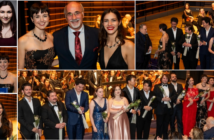
This page is also available in / Cette page est également disponible en:
![]() Francais (French)
Francais (French)
While its 2021 piano edition, won by South Korean Su Yeon Kim, certainly prevailed during the pandemic, it was only able to do so by pre-recording performance rounds in 16 cities throughout the world. This year, for the vocal edition, the Montreal International Music Competition (i.e. CMIM: Concours musical international de Montréal) can finally welcome back candidates on site, as well as live audiences to its halls. General and Artistic Director Christiane LeBlanc looks upon this reunion with great happiness. For her, the past two years have been synonymous with pitfalls, but also with extraordinary lessons for the future.
We expect a 100 per cent return, but we are not abandoning live webcasting. For a few years now, all our events have been broadcast on the internet. What we did during the pandemic was to multiply reception platforms. We have signed agreements with various music magazines as well as a Chinese platform that broadcasts classical music concerts (www.amadeus.tv). This allowed us to reach a much larger audience (more than 3 million cumulative views for the 2021 edition). We want to create gateways for all those who do not yet know about CMIM.
As with its audience, LeBlanc notes an increase and diversification of the pool of its pianist, violinist and singer applicants. The partnership that CMIM signed several years ago with Orchestre symphonique de Montréal is one of the many factors that, according to her, attracts very good candidates. “It is very rare for a competition to have an orchestra of this calibre. We are very proud of this partnership. Young people are also happy to be able to write on their CV that they have sung or played with the OSM.”
Despite the constant threat of the pandemic, a significant number of applications have been submitted for this year’s competition. A total of 387 singers applied, with only 32 selected to compete in the first rounds. Among them are many Canadians. For LeBlanc, this result is not really a surprise when you consider the success of their compatriots internationally. “Every time I go to Europe, people talk to me about Canadian singers who are everywhere on opera and concert stages; people talk to me about Marie-Nicole Lemieux, Jean-François Lapointe, Julie Boulianne, Karina Gauvin. Many of our singers are very well known and I think we have the reputation of having very good vocal training.”
With its more local singer-competitors, LeBlanc notes the influence of a certain cultural identity that goes back a long way. “When Quebec families couldn’t afford to buy a violin or a piano, they got into the habit of singing. I think it’s part of an oral tradition that is unique to us.” This is perhaps what partly explains the local public’s enthusiasm for singing. During previous editions, notably that of 2018 when South Korean tenor Mario Bahg won first prize in the Aria Division, spectators came in droves to Bourgie Hall and then to the Maison symphonique to watch the final rounds. “In 2018, we changed the format to have two distinct sections (one for song, accompanied by piano; the other for opera and oratorio with orchestra) and that year, we beat not only our record in terms of registrations, but also attendance.”
In 2022, several singers applied to participate in both the mélodie and aria sections, but only one candidate, mezzo-soprano Deepa Johnny (Canada/Oman), was accepted by CMIM’s pre-selection jury for both. “Most often, the members of the jury found a candidate much stronger in one rather than the other of these categories,” LeBlanc said.
With 10 years at the helm of CMIM, LeBlanc has seen many young talents pass through. According to her, the level of singers who participate in international competitions is constantly increasing. “Many of the selected competitors are either currently trainees or former trainees in opera training programs in Canada, the United States or Europe. These are people who often have a lot of stage experience. And God knows it takes that to do well in a contest. There’s a lot of preparation, a lot of psychological pressure and other factors that affect the performance of the singers: whether they’ll come first or last; whether they’ll leave a good impression on the jury; if the collaboration with the pianist who accompanies them will be good. It’s a big adventure for them.”
CMIM has made an asset of the overall experience it offers its singer-competitors. As LeBlanc explains, “they don’t feel like just a number, but they feel welcomed, surrounded, supported. They all have ‘godfathers’ and ‘godmothers’ who generously make a financial contribution to us so that we can buy their plane tickets, pay for all their supervision. Competitors are accommodated with host families and not alone at the hotel. After their early rounds, they don’t have to go back to a small room. We want them to leave with an enriching experience—a great life experience. Even if they do not win a prize, they will have made contacts, created links. Many of them return to Montreal and stay with their host families to maintain this bond. This reflects, it seems to me, the hospitable side of Quebecers and Canadians. It’s kind of in our nature.”
The greatest wish of CMIM, says LeBlanc, is to find its audience. “After two years of distancing and teleworking, we hope that [the public]will come in large numbers to encourage these young people who have been preparing for a long time already. We are excited to welcome back all Montrealers.”
Translation by Gianmarco Segato
This page is also available in / Cette page est également disponible en:
![]() Francais (French)
Francais (French)














